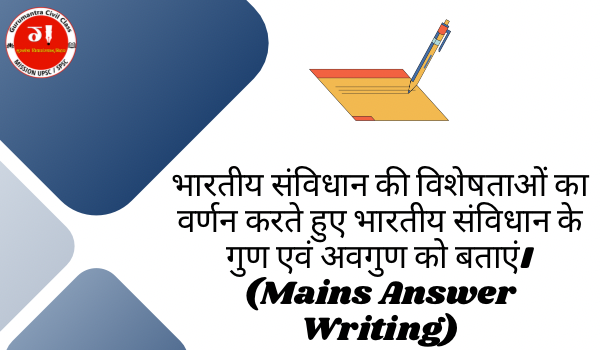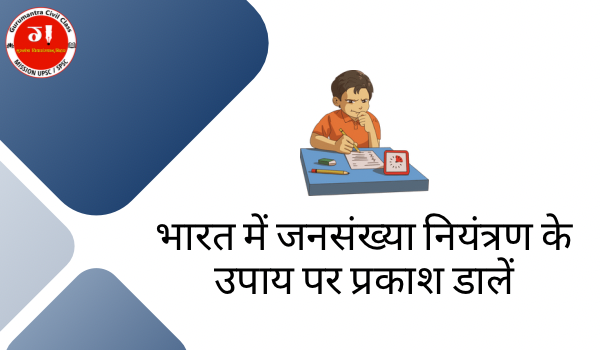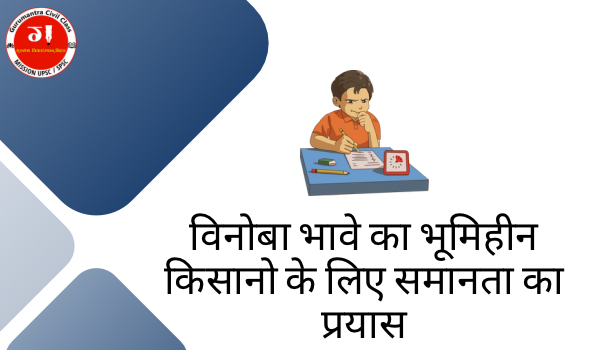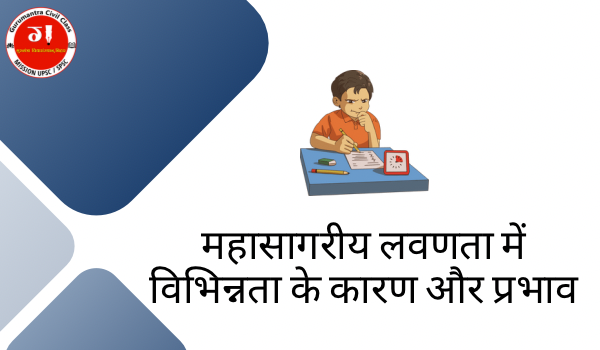Polity Mains Answer Writing For Civil Service
By - Gurumantra Civil Class
At - 2024-09-08 18:58:00
For Youtube Video,Just Click here
1.भारतीय संविधान की विषेशताओं का वर्णन करते हुए भारतीय संविधान के गुण एवं अवगुण को बताएं| (Describing the features of the Indian Constitution, state the merits and demerits of the Indian Constitution.)
अथवा/Or
भारतीय संविधान को लेकर आलोचकों के आलोचना को संदर्भ में रखते हुए उन बिंदुओं पर चर्चा करें जिससे भारतीय संविधान को एक आदर्श संविधान के रूप में देखा जा सकता है। (Keeping in view the criticism of the critics regarding the Indian Constitution, discuss those points by which the Indian Constitution can be seen as an ideal constitution.)
For Beginner Student (Direction keys)-
- संविधान किसे कहते है और यह क्यों महत्वपूर्ण है? (What is the constitution and why is it important?)
- भारतीय संविधान के निर्माण का व्याख्या करे| (Explain the making of Indian Constitution.)
- आपके नजर मे भारतीय संविधान मे क्या-क्या गुण है ?वर्णन करे| (In your view, what are the merits of the Indian Constitution?)
- आपके नजर मे भारतीय संविधान मे क्या खामियां है? वर्णन करे| (What do you think are the shortcomings in the Indian Constitution? describe.)
2. भारतीय संविधान के प्रस्तावना में वर्णित शब्दों को व्याख्या करते हुए संविधान के स्रोत स्वरूप और उद्देश्य पर चर्चा करें। (Discuss the source nature and purpose of the constitution explaining the words mentioned in the Preamble of the Indian Constitution.)
अथवा/Or
'प्रस्तावना' संविधान की 'आत्मा' या 'कुंजी' समान है, इस तथ्य पर प्रकाश डालें ।(Throw light on the fact that 'Preamble' is the 'soul' or 'key' of the constitution.)
अथवा/Or
'प्रस्तावना' में वर्णित शब्दों की व्याख्या करते हुए स्पष्ट करें कि 'भारत का संविधान' एक आदर्श संविधान है तथा 'प्रस्तावना' 'संविधान' के लिए 'दूरदर्शिता' का एक आदर्श माध्यम है। (Explaining the words mentioned in 'Preamble', explain that 'Constitution of India' is an ideal constitution and 'Preamble' is an ideal medium of 'vision' for 'Constitution'.)
For New Students-
1. प्रस्तावना से क्या समझते हैं? ( What do you understand by introduction?)
2. प्रस्तावना में संविधान के स्रोतों का वर्णन करें। (Describe the sources of the constitution in the preamble.)
3. प्रस्तावना में संविधान के उद्देश्यों का वर्णन करें। (Describe the objectives of the constitution in the preamble.)
4. प्रस्तावना में वर्णित संविधान के स्वरूप का वर्णन करें। (Describe the nature of the constitution mentioned in the preamble.)
5. प्रस्तावना के महत्व का वर्णन करें। (Describe the importance of preamble.)
6. प्रस्तावना किस प्रकार संविधान के लिए महत्वपूर्ण है, वर्णन करें। (Describe how the Preamble is important to the Constitution.)
3. भारत में नए राज्य के निर्माण के लिए संवैधानिक प्रक्रियाओं का वर्णन करते हुए चर्चा करें कि संघ के प्रकृति के मामले में भारत किस प्रकार संयुक्त राज्य अमेरिका से भिन्न है ? (Describe the constitutional procedures for the creation of a new state in India and discuss how India is different from the United States of America in terms of the nature of the federation.)
अथवा/Or
भारतीय संविधान के अनुच्छेद - 1 के अनुसार भारत जोकि इंडिया है एवं राज्यों का राज्य है। हालांकि भारत, संयुक्त राज्य अमेरिका की तरह अविनाशी राज्यों का अविनाशी संघ ना होकर अविनाशी राज्यों का विनाशी संघ है । अनुच्छेद 1 से लेकर अनुच्छेद 4 तक वर्णन करते हुए व्याख्या करें के यदि किसी राज्य को टुकड़े करके नए राज्य का निर्माण करना हो तो इसके लिए किस प्रकार की संवैधानिक प्रक्रिया है । (According to Article-1 of the Constitution of India, Bharat which is India and is a state of states. However, India is not an imperishable union of imperishable states like the United States of America, but a perishable union of imperishable states. Describing from Article 1 to Article 4, explain what kind of constitutional process is there if a state has to be divided into pieces to form a new
For Beginner Students -
1. भारतीय संविधान के अनुच्छेद - 1 के विषय में वर्णन करें। (Describe about Article-1 of the Indian Constitution.)
2. भारतीय संविधान के अनुच्छेद - 2 के विषय में वर्णन करें। (Describe about Article-2 of the Indian Constitution.)
3. भारतीय संविधान के अनुच्छेद - 3 के विषय में वर्णन करें। (Describe about Article-3 of the Indian Constitution.)
4. भारतीय संविधान के अनुच्छेद - 4 के विषय में वर्णन करें। (Describe about Article-4 of the Indian Constitution.)
5. यदि किसी राज्य का निर्माण किया जाता है तो इसके लिए किस प्रकार की संवैधानिक प्रक्रिया अपनाई जाती है। (If a state is created then what kind of constitutional process is adopted for it.)
6. कैसे भारत, संयुक्त राज्य अमेरिका की तरह अविनाशी राज्यों का अविनाशी संघ ना होकर विनाशी राज्यों का अविनाशी संघ है? (How is India not an imperishable union of imperishable states like the United States of America, but an imperishable union of perishable states?)
4. नागरिकता से क्या समझते हैं ? अनुच्छेद 5 से 11 तक का वर्णन करते हुए, भारत में नागरिकता प्राप्त करने के क्रमबद्ध परिवर्तित नियमों का वर्णन करें। (What do you understand by citizenship? Referring to paragraphs 5 to 11, describe the gradually changed rules for acquiring citizenship in India.)
For Beginner Student
1. नागरिकता किसे कहते हैं? (What is citizenship?)
2. भारतीय संविधान में नागरिकता से संबंधित अनुच्छेदों का वर्णन करें । (Describe the articles related to citizenship in the Indian Constitution.)
3. नागरिकता अधिनियम 1955 क्या है? (What is Citizenship Act 1955?)
4. नागरिकता अधिनियम 1986 में किस प्रकार के संशोधन हुए? (What types of amendments were made in the Citizenship Act 1986?)
5. नागरिकता अधिनियम 1992 में किस प्रकार के संशोधन हुए? (What types of amendments were made in the Citizenship Act 1992?)
6. नागरिकता अधिनियम 2003 में किस प्रकार के संशोधन हुए ? (What types of amendments were made in the Citizenship Act 2003?)
7. ओआईसी क्या है एवं इन्हें किस प्रकार की सुविधाएं प्राप्त है ? (What is OIC and what kind of facilities are available to them?)
5. मौलिक अधिकार से क्या समझते हैं ? भारतीय संविधान में वर्णित मौलिक अधिकारों का वर्णन करते हुए इसके महत्व को बताएं। (What do you understand by fundamental rights? Explain the importance of fundamental rights mentioned in the Indian constitution.)
अथवा/Or
मौलिक अधिकार किसी भी देश के नागरिक के भौतिक एवं नैतिक विकास के लिए आवश्यक है। भारत में नागरिकों को दिए गए मौलिक अधिकारों का को संदर्भ में रखते हुए उपयुक्त तथ्य का विश्लेषण करें। (Fundamental rights are essential for the physical and moral development of the citizens of any country. Analyze the above facts with reference to the fundamental rights given to the citizens in India.)
For Beginner Student -
1. मौलिक अधिकार से क्या समझते हैं ? (What do you understand by fundamental rights?)
2. मौलिक अधिकार नागरिकों के लिए क्यों आवश्यक है? (Why fundamental rights are necessary for the citizens?)
3. भारतीय संविधान में नागरिकों को किस प्रकार के मौलिक अधिकार दिया गया है? (What kind of fundamental rights have been given to the citizens in the Indian Constitution?)
4. अनुच्छेद 12 से 35 तक वर्णन करें । (Describe paragraphs 12 to 35.)
5. भारतीय नागरिकों को दिए गए मौलिक अधिकारों का विशेषताओं को बताएं। (State the features of fundamental rights given to Indian citizens.)5. नागरिकता अधिनियम 1992 में किस प्रकार के संशोधन हुए? (What types of amendments were made in the Citizenship Act 1992?)
6. नागरिकता अधिनियम 2003 में किस प्रकार के संशोधन हुए ? (What types of amendments were made in the Citizenship Act 2003?)
7. ओआईसी क्या है एवं इन्हें किस प्रकार की सुविधाएं प्राप्त है ? (What is OIC and what kind of facilities are available to them?)
6. राज्य के नीति निदेशक तत्व से क्या समझते हैं ? इसके महत्व, एवं उद्देश्य एवं उपयोगिता का वर्णन करते हुए वर्णन करें कि यह कैसे शासन का आधारभूत सिद्धांत है । (What do you understand by the Directive Principles of State Policy? Describing its importance, purpose and utility, describe how it is the basic principle of governance.)
अथवा/Or
राज्य के नीति निदेशक तत्व किसी राज्य के समावेशी, तीव्र गति एवं समानतावादी विकास के लिए महत्वपूर्ण है। स्पष्ट करें।(The Directive Principles of State Policy are important for the inclusive, fast-paced and egalitarian development of a state. Explain it.)
For new students -
1. राज्य के नीति निदेशक तत्व के विषय में वर्णन करें। (Describe the Directive Principles of State Policy.)
2. राज्य के नीति निदेशक तत्व से संबंधित प्रमुख अनुच्छेदों का वर्णन करें । (Describe the main articles related to the Directive Principles of State Policy.)
3. राज्य के नीति निदेशक तत्व के महत्व एवं उपयोगिता का वर्णन करें। (Describe the importance and utility of Directive Principles of State Policy.)
4. राज्य के नीति निदेशक तत्व में समाहित गांधीवादी समाजवादी एवं उदारवादी तत्वों का वर्णन करें। (Describe the Gandhian socialist and liberal elements contained in the Directive Principles of State Policy.)
5. राज्य के नीति निदेशक तत्व, शासन के आधारभूत सिद्धांत है। स्पष्टीकरण दें। (The Directive Principles of State Policy are the basic principles of governance. Give an explanation.)
7. मौलिक कर्तव्य से क्या समझते हैं? वर्मा समिति के रिपोर्ट को संदर्भ में रखते हुए विचार दे कि किस प्रकार भारत में नागरिकों को मौलिक कर्तव्य के प्रति अधिक से अधिक जागरूक किया जा सकता है ?(What do you understand by fundamental duty? Keeping in view the report of the Verma Committee, suggest how citizens can be made more and more aware of the fundamental duties in India?)
अथवा/Or
मूल कर्तव्य, मौलिक अधिकार के पूरक हैं। इस तथ्य का विश्लेषण करें। (Fundamental duties are complementary to fundamental rights. Analyze this fact.)
For Beginner Students -
1. मूल कर्तव्य से क्या समझते हैं?( What do you understand by fundamental duty?)
2. आप कैसे कह सकते हैं कि मौलिक अधिकार और मूल कर्तव्य एक दूसरे के पूरक है? (How can you say that fundamental rights and fundamental duties are complementary to each other?)
3. भारतीय संविधान में वर्णित मौलिक कर्तव्य का वर्णन करें।(Describe the Fundamental Duties mentioned in the Indian Constitution.)
4. मौलिक कर्तव्य को लेकर विभिन्न समितियों की रिपोर्टों का वर्णन करें। (Describe the reports of various committees on fundamental duties.)
8. कार्यपालिका से क्या समझते हैं ? वर्तमान समय में विश्व भर में कार्यपालिका के विभिन्न स्वरूपों का वर्णन करते हुए, भारत में कार्यपालिका का संरचना, महत्व और विशेषताओं का वर्णन करें।(What do you understand by executive? Describe the structure, importance and characteristics of the executive in India while describing the various forms of executive in the world at present.)
अथवा/Or
भारत में संयुक्त राज्य अमेरिका की तरह लोकतंत्र, गणतंत्र एवं दोहरी राजनीतिक प्रणाली अर्थात केंद्र एवं राज्य में अलग-अलग सरकारें है । किंतु अमेरिका में जहां अध्यक्षात्मक कार्यपालिका अपनाई गई है, वहीं भारत में संसदीय प्रणाली अपनाई गई है। उन बिंदुओं पर प्रकाश डालें जिससे स्पष्ट हो कि भारत में संसदीय प्रणाली ज्यादा उपयुक्त है। (Like the United States of America, India has a democracy, a republic and a dual political system, that is, separate governments at the center and in the states. But where the presidential executive has been adopted in America, the parliamentary system has been adopted in India. Throw light on those points which make it clear that parliamentary system is more suitable in India.)
For New Students
1. कार्यपालिका से क्या समझते हैं? (What do you understand by executive?)
2. अध्यक्षात्मक कार्यपालिका, संसदीय कार्यपालिका, दोहरी कार्यपालिका एवं बहुल कार्यपालिका का वर्णन करें। (Describe Presidential Executive, Parliamentary Executive, Dual Executive and Plural Executive.)
3. भारत में कार्यपालिका की संरचना का वर्णन करें । (Describe the structure of executive in India.)
4. भारत में संसदीय कार्यपालिका के महत्व एवं उपयोगिता का वर्णन करें।(Describe the importance and utility of parliamentary executive in India.)
9. भारतीय संविधान में वर्णित राष्ट्रपति की शक्तियों का वर्णन करते हुए संविधान में इसकी भूमिका स्पष्ट करें। (Explain the role of the President in the Constitution describing the powers of the President as mentioned in the Indian Constitution.)
अथवा/Or
भारत में राष्ट्रपति की भूमिका संवैधानिक प्रमुख तो है किंतु प्रशासनिक प्रमुख नहीं है। इस तथ्य का विश्लेषण करें। (The role of the President in India is the constitutional head but not the administrative head. Analyze this fact.)
For New Students -
1. भारत में राष्ट्रपति की भूमिका का वर्णन करें । (Describe the role of the President in India.)
2. भारतीय संविधान में राष्ट्रपति की कार्यपालिका, विधाई, न्यायिक और सैन्य शक्ति का वर्णन करें। (Describe the executive, legislative, judicial and military power of the President in the Indian Constitution.)
3. कैसे कह सकते हैं कि भारत में राष्ट्रपति प्रशासनिक प्रमुख नहीं है? (How can we say that the President is not the administrative head in India?)
10. विधायिका से क्या समझते हैं ? लोकतंत्र में विधायिका के महत्व एवं उद्देश्य का वर्णन करते हुए भारत में विधायिका के स्वरूप एवं संरचना का वर्णन करें। (What do you understand by legislature? Explaining the importance and purpose of legislature in a democracy, describe the nature and structure of legislature in India.)
For New Students -
1. विधायिका से क्या समझते हैं ? (What do you understand by legislature?)
2. शासन व्यवस्था के लिए विधायिका का क्या महत्व है ? (What is the importance of legislature for governance?)
3. भारत में विधायिका के स्वरूप का वर्णन करें। (Describe the nature of legislature in India.)
4. भारत में विधायिका के संरचना का वर्णन करें । (Describe the structure of the legislature in India.)
11. विधेयक से क्या समझते हैं ? भारत में विधेयक की प्रक्रियाओं का वर्णन करते हुए इसमें राष्ट्रपति की भूमिका को स्पष्ट करें । (What do you understand by Bill? Explain the role of the President in this by describing the procedures of the Bill in India.)
अथवा/Or
राष्ट्रपति की शक्तियों को संदर्भ में रखते हुए भारत में 'विधेयक' को 'अधिनियम' तक बनने की प्रक्रिया का विश्लेषण करें । (Analyze the process of making a 'Bill' to an 'Act' in India with reference to the powers of the President.)
For New Students -
1. विधेयक से क्या समझते हैं ? (What do you understand by Bill?)
2. विधेयक कितने प्रकार के होते हैं ? (How many types of bills are there?)
3. कोई भी विधेयक अधिनियम में कब परिवर्तित होता है ? (When does a bill convert into an act?)
4. विधेयक में राष्ट्रपति की भूमिका को स्पष्ट करें। (Explain the role of the President in the Bill.)
12. भारत में केंद्रीय कार्यपालिका और राज्य की कार्यपालिका के कार्यों एवं शक्ति का वर्णन करते हुए इनके मध्य समानता एवं अंतर को स्पष्ट करें।(Explain the similarities and differences between the central executive and state executive in India by describing their functions and powers.)
For New Students
1. भारत में केंद्रीय कार्यपालिका के कार्य एवं शक्ति का वर्णन करें। (Describe the functions and powers of the Central Executive in India.)
2. भारत में राज्य के कार्यपालिका के कार्य एवं शक्ति का वर्णन करें।(Describe the functions and power of the executive of the state in India.)
3. भारत में केंद्रीय कार्यपालिका एवं राज्य के कार्यपालिका के कार्य एवं शक्ति में समानता को बताएं।(State the similarity in the work and power of the Central Executive and the State Executive in India.)
4. भारत में केंद्रीय कार्यपालिका एवं राज्य के कार्यपालिका के कार्य एवं शक्ति में अंतर को बताएं। (Explain the difference between the work and power of the central executive and the state executive in India.)
13. भारत में केंद्रीय विधायिका और राज्य की विधायिका के कार्यों एवं शक्ति का वर्णन करते हुए इनके मध्य समानता एवं अंतर को स्पष्ट करें। (Explain the similarities and differences between the Central Legislature and the State Legislatures in India by describing their functions and powers.)
For New Students
1. भारत में केंद्रीय विधायिका के कार्य एवं शक्ति का वर्णन करें। (Describe the functions and powers of the Central Legislature in India.)
2. भारत में राज्य के विधायिका के कार्य एवं शक्ति का वर्णन करें। (Describe the functions and powers of the state legislature in India.)
3. भारत में केंद्रीय विधायिका एवं राज्य के विधायिका के कार्य एवं शक्ति में समानता को बताएं। (State the similarity in the work and power of the Central Legislature and the State Legislature in India.)
4. भारत में केंद्रीय विधायिका एवं राज्य के विधायिका के कार्य एवं शक्ति में अंतर को बताएं। (Explain the difference between the work and power of the Central Legislature and the State Legislature in India.)
14. लोकतंत्र में न्यायपालिका के महत्व का वर्णन करते हुए स्पष्ट करें कि भारत के न्यायिक प्रणाली किस प्रकार ब्रिटेन के न्यायिक प्रणाली से भिन्न है ? (Describing the importance of judiciary in a democracy, explain how the judicial system of India is different from the judicial system of Britain?) अथवा/Or
भारत जहां की दोहरी राजनीतिक प्रणाली है वहीं ब्रिटेन में एकात्मक राजनीतिक प्रणाली है। दोनों प्रणाली में न्यायपालिका के भूमिका को स्पष्ट करें। (While India has a dual political system, Britain has a unitary political system. Explain the role of judiciary in both the systems.)
For Beginner Student -
1. न्याय से क्या समझते हैं ?(What do you understand by justice?)
2. शासन में न्यायपालिका का क्या महत्व है ?(What is the importance of judiciary in governance?)
3. प्रकृति के आधार पर न्यायपालिका के कितने स्वरूप देखे जाते हैं ? (How many forms of judiciary are seen on the basis of nature?)
4. भारत में न्यायपालिका के विशेषताओं का वर्णन करें । (Describe the features of Judiciary in India.)
5. भारत में न्यायपालिका किस प्रकार ब्रिटेन से भिन्न है ? (How is the judiciary in India different from Britain?)
15. भारतीय संविधान में न्यायपालिका से संबंधित प्रमुख प्रावधानों का वर्णन करते हुए न्यायिक सक्रियता एवं न्यायिक संयम में अंतर स्पष्ट करें। (Explain the difference between judicial activism and judicial restraint by describing the main provisions related to judiciary in the Indian constitution.)
For Beginner Student -
1. शासन में न्यायपालिका के महत्व का वर्णन करें । (Describe the importance of Judiciary in governance.)
2. भारत में न्यायपालिका की प्रकृति का वर्णन करें । (Describe the nature of Judiciary in India.)
3. भारतीय संविधान में वर्णित सर्वोच्च न्यायालय के शक्ति एवं कार्यों का वर्णन करें।(Describe the power and functions of the Supreme Court as described in the Indian Constitution.)
4. भारतीय संविधान में वर्णित उच्च न्यायालय के शक्ति एवं कार्यों का वर्णन करें।(Describe the power and functions of the High Court as described in the Indian Constitution.)
5. भारतीय संविधान में वर्णित अधिनस्थ न्यायालय के शक्ति एवं कार्यों का वर्णन करें। (Describe the power and functions of the Subordinate Court as described in the Indian Constitution.)
16. भारतीय संविधान में केंद्र तथा राज्य के संबंधों का विश्लेषण करते हुए भारत की संघीय प्रकृति को स्पष्ट करें। (Explain the federal nature of India by analyzing the relationship between the Center and the States in the Indian Constitution.)
For New Students -
1. भारतीय संविधान में केंद्र तथा राज्यों के बीच विधायी संबंधों का वर्णन करें। (Describe the legislative relationship between the Center and the States in the Indian Constitution.)
2. भारतीय संविधान में केंद्र तथा राज्यों के बीच प्रशासनिक संबंधों का वर्णन करें। (Describe the administrative relations between the Center and the States in the Indian Constitution.)
3. भारतीय संविधान में केंद्र तथा राज्यों के बीच वित्तीय संबंधों का वर्णन करें । (Describe the financial relations between the Center and the States in the Indian Constitution.)
4. केंद्र तथा राज्य के बीच न्यायिक संबंध को लेकर भारत तथा संयुक्त राज्य अमेरिका के बीच अंतरों को स्पष्ट करें। (Explain the differences between India and the United States of America with regard to the judicial relationship between the Center and the States.)
5. आपातकाल की स्थिति में भारतीय संविधान में केंद्र तथा राज्यों की संबंधों को वर्णन करें। (Describe the relationship between the Center and the States in the Indian Constitution in the event of an emergency.)
17. भारतीय संविधान में न्यायिक सक्रियता की भूमिका का वर्णन करते हुए उन बिंदुओं पर प्रकाश डालें जिससे स्पष्ट हो सके की न्यायिक सक्रियता लोकतंत्र की मजबूती के लिए आवश्यक है।(While describing the role of judicial activism in the Indian Constitution, throw light on those points to make it clear that judicial activism is necessary for the strength of democracy.)
For New Students -
1. न्यायिक सक्रियता से क्या समझते हैं ? (What do you understand by judicial activism?)
2. भारतीय संविधान में न्यायिक सक्रियता का वर्णन करें। (Describe judicial activism in the Indian Constitution.)
3. न्यायिक सक्रियता के महत्व का वर्णन करें । (Describe the importance of judicial activism.)
4 न्यायिक सक्रियता लोकतंत्र को किस प्रकार मजबूती प्रदान करती है । (How does judicial activism strengthen democracy?)
18. अनुच्छेद 21 के बारे में वर्णन करते हुए उन बिंदुओं पर प्रकाश डालें जो किसी व्यक्ति को गरिमामय जीवन जीने में बाधा बनती है । (While describing Article 21, throw light on those points which hinder a person from living a dignified life.)
19. ' अनुच्छेद 19' के विषय में व्याख्या करें एवं हाल फिलहाल में हुए घटनाओं का उदाहरण देते हुए स्पष्ट करें कि स्वतंत्रता के अधिकार का निर्बंधन आवश्यक है । (Explain about 'Article 19' and by giving examples of recent incidents, explain that restriction of the right to freedom is necessary.)
For New Students -
1. अनुच्छेद 19 में दिए गए स्वतंत्रता के अधिकारों का वर्णन करें । (Describe the rights of freedom given in Article 19.)
2. अनुच्छेद 19 में दिए गए स्वतंत्रता के अधिकारों को किस प्रकार निर्बंधित किया गया है । (How have the rights to freedom given in Article 19 been restricted?)
3. उन घटनाओं का वर्णन करें जो स्वतंत्रता के अधिकारों का किए गए निर्बंधन का अवज्ञा करता हो। (Describe those incidents which violate the restriction of the rights of freedom.)
20. भारतीय संविधान के व्यवस्था के अनुसार चुनाव आयोग एक स्वतंत्र निकाय है किंतु इसके बावजूद उनकी भूमिका पर प्रश्न चिन्ह लगाते रहे हैं। चुनाव आयोग ने भी निष्पक्ष एवं पारदर्शी चुनाव के लिए समय-समय पर कई बदलाव करते आए हैं। चुनाव आयोग की संवैधानिक स्थिति को स्पष्ट करते हुए उन प्रयासों का वर्णन करें जो निष्पक्ष एवं पारदर्शी चुनाव के लिए किए गए हैं। According to the provisions of the Indian Constitution, the Election Commission is an independent body, but despite this, questions have been raised on its role. The Election Commission has also been making many changes from time to time for fair and transparent elections. Explaining the constitutional position of the Election Commission, describe the efforts that have been made for fair and transparent elections.
For New Students -
1. भारत में चुनाव आयोग की संवैधानिक स्थिति का वर्णन करें। (Describe the constitutional position of the Election Commission in India.)
2. चुनाव आयोग की आवश्यकता एवं महत्व का वर्णन करें । (Describe the need and importance of Election Commission.)
3. चुनाव आयोग के द्वारा किए गए महत्वपूर्ण सुधारो का वर्णन करें । (Describe the important reforms made by the Election Commission.)
4. आपके विचार से भारत में चुनाव आयोग में कौन-कौन से सुधार की आवश्यकता है ? (In your opinion, what reforms are needed in the Election Commission in India?)
21. भारत के संविधान अनुच्छेद 1 के अनुसार भारत राज्यों का समूह है किंतु भारत को ढांचा से संघात्मक एवं आत्मा से एकात्मक माना जाता है । इसके बावजूद भारत में राज्यों के पास कई ऐसी शक्ति है जो केंद्र के विरुद्ध उन्हें मजबूती प्रदान करती है । उपयुक्त कथन का विश्लेषण करें। According to Article 1 of the Constitution of India, India is a group of states but India is considered federal in structure and unitary in spirit. Despite this, the states in India have many powers which strengthen them against the Centre. Analyze the appropriate statement.
22. भारतीय संविधान में अनुसूचित जाति और जनजाति के संरक्षण में कई प्रावधान दिए गए हैं किंतु इसके बावजूद वर्तमान समय में ऐसी कई घटनाएं देखने को मिलती है जो इस समाज के लोगों के प्रति चिंता का विषय है। अनुसूचित जाति और जनजाति के लिए संवैधानिक प्रावधानों का वर्णन करते हुए उन उपायों पर चर्चा करें जिससे इस समाज के लोगों को संरक्षित रखते हुए विकास के मुख्य धारा के साथ जोड़ा जा सके । (Many provisions have been given in the Indian Constitution for the protection of Scheduled Castes and Tribes, but despite this, many such incidents are seen in the present time which are a matter of concern for the people of this society. While describing the constitutional provisions for Scheduled Castes and Tribes, discuss the measures by which the people of this society can be protected and integrated with the main stream of development.)
23. भारतीय संविधान के संघीय व्यवस्था एवं एकात्मक व्यवस्था के लक्षणों का विश्लेषण करें। (Analyze the features of federal system and unitary system of the Indian Constitution.)
For New Students -
1. भारतीय संविधान का संक्षिप्त विवरण दें । (Give a brief description of the Indian Constitution.)
2. भारतीय संविधान में कौन-कौन से संघीय व्यवस्था होने के गुण है ? (What are the qualities of a federal system in the Indian Constitution?)
3. भारतीय संविधान में कौन-कौन से एकात्मक व्यवस्था होने के गुण है ? (What are the qualities of a unitary system in the Indian Constitution?)
24. भारतीय संविधान द्वारा व्यक्ति के भौतिक और नैतिक विकास के लिए मौलिक अधिकार प्रदान किया गया है, किंतु स्वतंत्रता के इतने वर्ष के पश्चात भी अधिकांश भारतीय नागरिक अपने मौलिक अधिकारों का सही प्रयोग नहीं कर पा रहे हैं । इसके कारणों पर प्रकाश डालते हुए उन बिंदुओं पर चर्चा करें जिससे भारत के नागरिक अपने मौलिक अधिकारों का उचित प्रयोग कर सके। (The Indian Constitution has provided fundamental rights for the physical and moral development of an individual, but even after so many years of independence, most of the Indian citizens are not able to properly utilize their fundamental rights. Throwing light on its reasons, discuss those points so that the citizens of India can properly exercise their fundamental rights.)
For New Students -
1. मौलिक अधिकार से क्या समझते हैं ? (What do you understand by fundamental rights?)
2. मौलिक अधिकार के महत्व का वर्णन करें । (Describe the importance of fundamental rights.)
3. भारतीय संविधान में वर्णित मौलिक अधिकार का संक्षिप्त परिचय दें । (Give a brief introduction of the fundamental rights mentioned in the Indian Constitution.)
4. उन कारणों पर प्रकाश डालें, जिससे भारत के नागरिक अपने मौलिक अधिकारों के उचित प्रयोग से वंचित है। (Throw light on the reasons due to which the citizens of India are deprived of the proper exercise of their fundamental rights.)
5. उन उपायों पर प्रकाश डालें, जिससे भारत के नागरिक संविधान द्वारा दिए गए मौलिक अधिकारों का उचित प्रयोग कर सके। (Throw light on those measures by which the citizens of India can properly exercise the fundamental rights given by the Constitution.)
 By Chandrashiv Sir
By Chandrashiv Sir
Founder & Director Gurumantra Civil Class
Verma Centre, 603, 6th floor, Boring Road Patna,01
College Chowk, Near Purnia University, Purnea, 854301
Contact- 9135904639
Comments
Releted Blogs

भारतीय संविधान की विशेषताओं का वर्णन करते हुए भारतीय संविधान के गुण एवं अवगुण को बताएं।(Mains Answer Writing)
By - Gurumantra Civil Class
Gurumantra GS Answer Writing Practice

भारत में जनसंख्या नियंत्रण के उपाय पर प्रकाश डालें - Answer writing for Mains Exam
By - Gurumantra Civil Class
जनसंख्या नियंत्रण के लिए किए गए प्रयास एवं उपाय

विनोबा भावे का भूमिहीन किसानों के लिए समानता का प्रयास(Vinoba Bhave's attempt at equality for the landless farmers) GS Mains Writing
By - Gurumantra Civil Class
GS Mains Writing for Civil Service

महासागरीय लवणता में विभिन्नता के कारण और प्रभाव ( Causes and Effects of Variation in Ocean Salinity) GS Mains Answer Writing
By - Gurumantra Civil Class
GS Mains Answer Writing for Civil Service Exam.